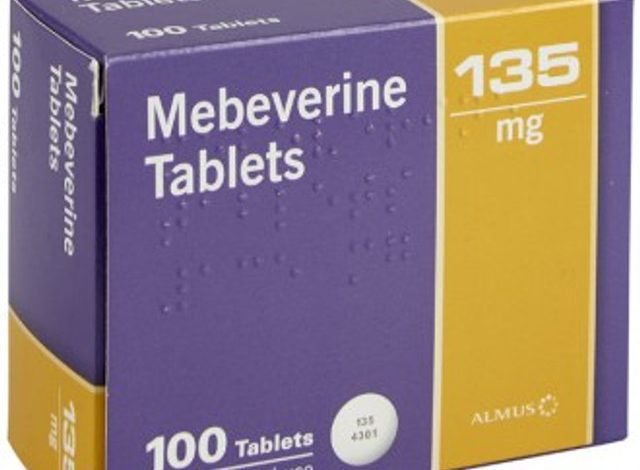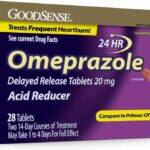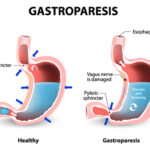Can I Take Omeprazole And Mebeverine Together?

Omeprazole and mebeverine are both medications that are commonly used to treat gastrointestinal (GI) conditions. Omeprazole is a proton pump inhibitor that reduces the amount of acid produced in the stomach, while mebeverine is an antispasmodic medication that helps to relieve muscle spasms in the gut. While these medications work in different ways, they can be used together in some cases to treat certain GI conditions. However, it is important to understand how these medications work and their potential interactions before taking them together.
What is Omeprazole?
Omeprazole belongs to a class of medications called proton pump inhibitors (PPIs). It works by reducing the amount of acid produced in the stomach by blocking the enzyme responsible for producing stomach acid. Omeprazole is commonly used to treat conditions such as gastroesophageal reflux disease (GERD), peptic ulcers, and Zollinger-Ellison syndrome, a rare condition in which the stomach produces too much acid.
Omeprazole is available in both prescription and over-the-counter (OTC) forms. The prescription form is typically used to treat more severe or chronic conditions, while the OTC form is intended for short-term use to relieve occasional heartburn or acid indigestion.
What is Mebeverine?
Mebeverine is an antispasmodic medication that is used to treat conditions such as irritable bowel syndrome (IBS), functional bowel disorders, and other conditions that cause muscle spasms in the gut. Mebeverine works by relaxing the smooth muscle in the gut, which helps to relieve abdominal cramps, bloating, and other symptoms associated with these conditions.
Mebeverine is typically taken orally as a tablet or capsule and is available in both prescription and OTC forms. It is generally considered safe and well-tolerated, with few reported side effects.
Can Omeprazole and Mebeverine be Taken Together?
In most cases, it is safe to take omeprazole and mebeverine together. These medications work in different ways and are often used to treat different GI conditions, so there is typically no significant interaction between the two. However, it is important to talk to your healthcare provider before taking these medications together, as they may have specific recommendations or concerns based on your individual health status and the specific condition you are treating.
Possible Benefits of Taking Omeprazole and Mebeverine Together
While omeprazole and mebeverine are often used to treat different GI conditions, there are some situations in which taking these medications together may be beneficial. Some possible benefits of taking omeprazole and mebeverine together include:
1. Treating both acid reflux and muscle spasms: For people with conditions such as GERD or functional bowel disorders, taking omeprazole and mebeverine together may help to address both the acid reflux and muscle spasms that contribute to their symptoms.
2. Reducing side effects: In some cases, taking mebeverine alone may cause side effects such as nausea, vomiting, or diarrhea. Taking omeprazole along with mebeverine may help to reduce these side effects by reducing the amount of acid in the stomach.
3. Improving overall symptom relief: By addressing both acid reflux and muscle spasms, taking omeprazole and mebeverine together may provide more comprehensive symptom relief for people with GI conditions.
Potential Risks of Taking Omeprazole and Mebeverine Together
While taking omeprazole and mebeverine together is generally safe, there are some potential risks to be aware of. These include:
1. Interactions with other medications: Both omeprazole and mebeverine may interact with other medications, including prescription and over-the-counter drugs, vitamins, and herbal supplements. It is important to inform your healthcare provider of all medications and supplements you are taking, as some combinations may increase the risk of side effects or reduce the effectiveness of the medications.
2. Increased risk of infections: Omeprazole and other proton pump inhibitors have been associated with an increased risk of gastrointestinal infections, such as Clostridium difficile (C. difficile) and pneumonia. While mebeverine is not associated with an increased risk of infection, taking omeprazole may increase the risk of these infections when taken with mebeverine.
3. Adverse effects on kidney function: Prolonged use of omeprazole has been associated with an increased risk of kidney damage or disease, particularly in people with pre-existing kidney problems or those taking high doses of the medication. Mebeverine is not associated with an increased risk of kidney damage, but taking omeprazole with mebeverine may increase the risk of adverse effects on kidney function.
4. Allergic reactions: Some people may be allergic to omeprazole or mebeverine, and taking these medications together may increase the risk of an allergic reaction. Symptoms of an allergic reaction may include rash, itching, swelling, dizziness, and difficulty breathing. If you experience any of these symptoms, seek medical attention immediately.
5. Side effects: Both omeprazole and mebeverine may cause side effects, such as nausea, vomiting, diarrhea, constipation, headache, and dizziness. Taking these medications together may increase the risk of these side effects. If you experience any of these symptoms, contact your healthcare provider.
Precautions to Take When Taking Omeprazole and Mebeverine Together
To reduce the risk of potential risks associated with taking omeprazole and mebeverine together, it is important to follow these precautions:
1. Talk to your doctor or healthcare provider: Before taking omeprazole and mebeverine together, inform your doctor or healthcare provider of all medications and supplements you are taking, as well as any medical conditions you have. Your doctor may have specific recommendations or concerns based on your individual health status and the specific condition you are treating.
2. Follow dosage instructions: Take both medications exactly as prescribed by your healthcare provider or as directed on the label. Do not exceed the recommended dose, as this may increase the risk of side effects.
3. Watch for side effects: Be aware of the potential side effects of both medications and contact your healthcare provider if you experience any symptoms that concern you.
4. Take with food: Both omeprazole and mebeverine should be taken with food to reduce the risk of stomach upset.
5. Avoid alcohol: Alcohol may increase the risk of side effects associated with both medications. It is recommended to avoid alcohol while taking omeprazole and mebeverine.
Conclusion
In conclusion, omeprazole and mebeverine can be taken together in most cases, and there may be some potential benefits to taking these medications together for certain GI conditions. However, it is important to understand the potential risks associated with taking these medications together, including interactions with other medications, increased risk of infections, adverse effects on kidney function, allergic reactions, and side effects. It is recommended to talk to your doctor or healthcare provider before taking omeprazole and mebeverine together and to follow all precautions to reduce the risk of potential adverse effects.





